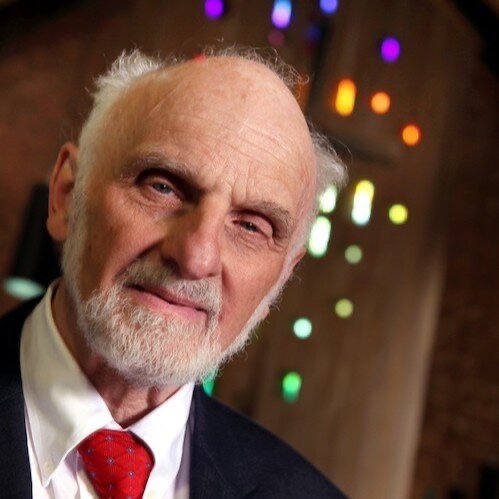Walter Brueggemann Column
Church Anew is honored to host Walter Brueggemann as our featured columnist. We look forward to sharing Walter’s work with church leaders and faithful people worldwide. May his powerful and reflective writings inspire, energize, guide, and comfort you.

History is Clay
The world is indeed malleable, given leadership that is grounded, bold, and caring
Cascade! Divine?
The text of Job 1:13-19 is part of a “folk tale” in the Book of Job that frames the poetry that follows. The “folk tale” gives us a glimpse of the governing power of the creator God which is concealed from Job. God is unnamed in these verses though verse 16 allows a conventional phrase, “the fire of God.” It is often noted that in the prologue and the epilogue of the Book of Job, God is called by the Israelite name, YHWH. That naming of YHWH anchors the Book of Job in the Israelite tradition, even though in the poetry Job God is not so identified. In any case, behind the narrative is the governing force and will of the creator God who makes covenant with Israel.

The Voice of the Victim
In this blog, Walter Bruggemann discusses an unlikely group of people who come together through music. He connects this to the book of revelation and the Roman Empire.

A Music-Making Counter-Community
In this blog, Walter Bruggemann discusses an unlikely group of people who come together through music. He connects this to the book of revelation and the Roman Empire.

Tractor: Icon of Predatory Development
In this blog, Walter Bruggermann compares three examples of authors using the tractor as a symbol of exploitation and industrialization.


Hoe! Hoe! Hoe!
In this blog, Walter Bruggermann reflects on Amos 9:7 and how everyone including the marginalized and underrepresented are beloved children of God.

Two Farmers…Two Ways
In this blog, Walter Bruggermann reflects on Amos 9:7 and how everyone including the marginalized and underrepresented are beloved children of God.

The God of the Other (Amos 9:7)
In this blog, Walter Bruggermann reflects on Amos 9:7 and how everyone including the marginalized and underrepresented are beloved children of God.

Reflecting Awe: Intersecting Pietism, Faith, and Science
The tradition of pietism that informs my faith was enormously elastic and agile in its recognition of new learning, including advances in science.


Humanity Erased?
We remain before the tricky question, “What is a woman or man”? What is humanity? The answer we give to that question is that we humans are “lord of all, servant of all.” I suspect that Kirsch and his company would and could to some great extent share that conviction. The hard part is living it out, and thereby creating futures that are beyond technological rationality. That hard work is the reason we gather regularly around the news of dying and being raised to new life.

The End of Imagination?
Imagination is the capacity to host a world other than the one that is in front of us. Such an act of hosting an alternative world is inherently subversive, as it serves to question and override the world in front of us that we too easily take as given.

Trees: Signals of Hope and Defiance
The children’s book by Franck Prevot is entitled Wangari Maathai: The Woman Who Planted Millions of Trees (2015) has led me to think about trees and the role they play in the Bible for a viable creation (and a viable economy). That crucial role played by trees has been played since the appearance of trees on the third day of creation (Genesis 1:11-13). This is some of what I learned about trees in the Bible.

Singing the Counter-Culture
We know and trust that the force of this other world does not evaporate when we close our hymnals. It persists. Our signing into that other world may also persist. We return to our more mundane worlds close at hand. But the singing persists and so that world persists among us, deabsolutizing the world in front of us, permitting us to host that other world and sign on for “a more excellent way” marked by faith, hope, and love.

We Count Our Days
Maybe, as the TV ad has it, “Age is simply a number.” But I think not. It is our best human way of marking our reliance on God’s grace and living it back to God in gratitude as best we can.

Defying Erasure
In Christian confession, the ultimate moment of imperial erasure is on Good Friday. By sundown on that Friday, the emperor, the governor, and the Jewish king, Herod, all thought they had effectively erased and eliminated the threat of the alternative governance that Jesus embodied.

The City as “Container”
For the writer of the Book of Revelation, this promise is not in a never never land of another world; it refers to a new city that will displace the tired violent city of Babylon (Rome).

Deserves to be Paid
It cannot be unimportant to the church that the long-running story of God’s engagement with the human economy begins in the narrative of a labor dispute.

Money Talk in the Church
It is unmistakable that the Torah designation of covenantal economics persists in the narrative reflection of the New Testament. It remains for the church to recover this awareness about the economy in our tradition, and to recover the courage necessary to contest the predatory practices of our economy that have become normative in our society.

